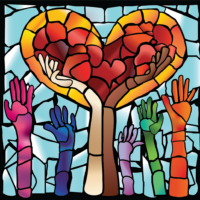The Rev. Canon Sharon Alexander
Canon to the Ordinary
Many of us have been watching the destruction caused by Hurricane Ida. Our desire to be generous is heightened when we witness this type destruction. I served as Outreach Director at Trinity Episcopal Church in New Orleans a few years after Hurricane Katrina, and as a Rector in southern Louisiana dealt with the aftermath of hurricanes and major flood. People have often asked me for guidance on providing help. These are a few things I have learned.
- Right now, monetary donations are best. Please follow the Diocese of Louisiana and Episcopal Relief and Development on social media for ways to give directly. We will also share these trusted ways to give on the EDWTN social media.
- It is best not to try to deliver supplies unless you have arranged with a reputable group (church, nonprofit, etc.) ahead of time to drop off the items. Bring only what the group tells you they need rather than what your donors want to give. Please do not donate used clothes at all.
- Making arrangements with a local group ahead of time is critical before showing up to help. Accommodations will be hard to find and may be needed by local residents. There will be plenty of opportunities to help later and that help will be needed later as much as help from emergency responders is needed now. Cleanup and recovery is like a relay marathon – each leg of the marathon is important.
- Gift cards are always a good way to help. It may be a couple of weeks before people can start using them (inventory will be erratic for a while, and many stores will be closed), but if the local churches and other organizations have the cards in hand, they can give them out at the right time.
- The needs of the community will change. At first, people will need certain items: personal hygiene items such as soap, shampoo, toothpaste, and deodorant. In most cases, normal sizes are actually better than the hotel/travel sizes. Other important items that will be needed right away include food that is easy to store and prepare, bottles of water, new towels, cleaning items, and mosquito repellant.
After they get back in their homes, they will need: more personal hygiene items (normal size); more food; all types of cleaning items, especially mold control products; rubber gloves; new clothes and underwear; new sheets; diapers and wipes (LOTS of them – all sizes); adult diapers; detergent; toilet paper; paper towels; more mosquito repellant; LOTS of gift cards. The huge Sams and Costco packages are not as helpful as smaller packaging unless the huge packaging can be taken apart.
Later, some will need new furniture and appliances. Let the people coordinating the relief and recovery efforts tell you what they need. - Don’t forget the animals. Pet food, kitty litter, etc. will be needed, but make sure it is something the distribution center needs. Animal rescue centers will needs lots of help; ask them what they need.
7. Be patient. If a church or nonprofit does not respond to your request quickly, it is because they are taking care of immediate needs. Keep them in your prayers. Post uplifting things on social media. Pray.
















